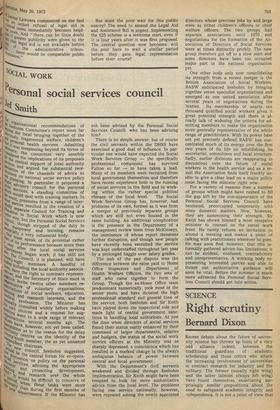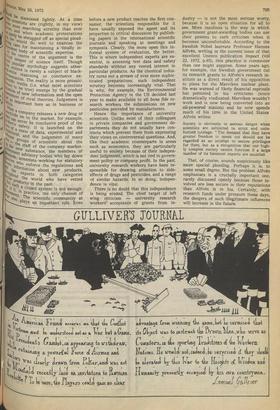SCIENCE
Right scrutiny
Bernard Dixon
Recent debate about the future of university science has thrown up hints of a very odd alliance indeed, between the traditional guardians of academic scholarship and those critics who attack the increasing involvement of universities in contract research for industry and the military. The former (usually right wing) and the latter (almost always left wing) have found themselves enunciating surprisingly similar propositions about the need to safeguard academic integrity and independence. It is not a point of view that .lier. be dismissed lightly. At a time ,11cCe' scientists are (rightly, in my view) 'JEfoi.r More searching scrutiny than ever kn'e"' and when academic protestations asilY be shrugged off as special plead
g .. v„„.
' would do well to examine thekpe,, case for maintaining a totally in fle,nt body of scientific expertise. ritiw`ne centre of the argument is the kchtemPer of science itself. Though P°Pula r mythology suggests otherikivihsience is rarely a subject of black ki-rt;te reasoning or conclusive exkient;2tation. The reality is more prosaic: "1c v truths (i.e. what most scientists ictrete. to be true) emerge by the gradual lises,d,„°11 of new information and the open Ittt ;"'ent of rival theories. Judgement is Iij irnPortant here as in business or „ litsee.ela. a company releases a new drug or ViIre"`Icle on to the market, for example, ca never be conclusive proof of the -e,tc's safety. It is launched on the a mass of data, experimental and 4fe'r—`ural, and the judgement of many ent grouPs of scientists about the .tt 0'1' the staff of the company marketflew new substance, the members o Nridt advisory bodies who lay down IN,,,rcis, scientists working for statutory Itree-„leswho enforce the regulations and th information about new products, experts in both categories litner tiout the world who have vetted ilua Products in the past. kor t. such a closed system is not enough. It' in practice, the only channel of krge Illent. ,The scientific community at before a new product reaches the first consumer, the scientists responsible for it have usually exposed the agent and its properties to critical discussion by publishing papers in the international scientific journals and speaking at meetings and symposia. Clearly, the more open this informal system of evaluation, the better. This is where independent experts are essential, in assessing test data and safety standards without any vested interest in particular products. As the chemical industry turns out a stream of ever more sophisticated preparations, such independent scrutiny becomes increasingly vital. That is why, for example, the Environmental Protection Agency in the US decided last year to make available to all bona fide research workers the submissions on new pesticides provided by manufacturers.
Hence the importance of university scientists. Unlike most of their colleagues in private companies and government departments they do not usually have contracts which prevent them from expressing their views on controversial questions. And, like their academic counterparts in areas such as economics, they are particularly useful to society because of their independent judgement, which is not tied to government policy or company profit. In the past. university research workers have been responsible for drawing attention to sideeffects of drugs and pesticides, and a range of similar hazards. In so doing, independence is vital. There is no doubt that this independence is being eroded. The chief target of left wing criticism — university research f erants from in a dustry — is not the most serious worry, because it is an open situation for all to see. More insidious is the way in which government grant-awarding bodies can use their powers to curb criticism when it becomes uncomfortable. According to the Swedish Nobel laureate Professor Hennes Alfven, writing in the current issue of that excellent Unesco publication Impact (vol 22, 1972, p.85), this practice is commoner than one might suppose. Some years ago, for example, the Swedish government cut its research grants to Alfven's research institute as a direct result of his opposition to plans for the Marviken nuclear plant. He was warned of likely financial reprisals but persisted in his criticisms (since dramatically vindicated: Marviken wouldn't work and is now being converted into an oil-powered station) and he now spends much of his time in the United States Alfven writes: Society is obviously in serious danger when scientists are subjected to strict and uninformed tutelage. '' The demand that they have greater freedom to speak out should not be regarded as an attempt to secure privileges for them, but as a recognition that our highly complex society cannot function if a large number of its foremost experts are muzzled.
That, of course, sounds suspiciously like more special pleading. Perhaps it is, to some small degree. But the problem Alfven emphasises is a crucially important one, rarely discussed openly because those involved are less secure in their reputations than Alfven is in his. Certainly, with research funds under pressure these days, the dangers of such illegitimate influences will increase in the future.











































 Previous page
Previous page